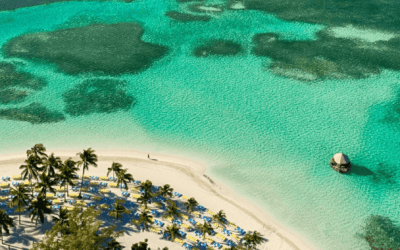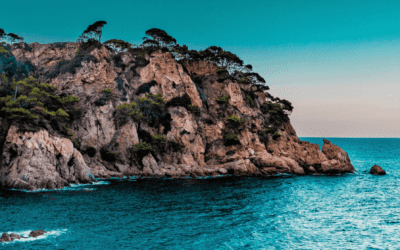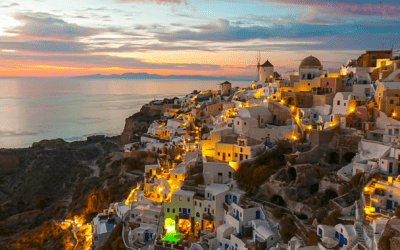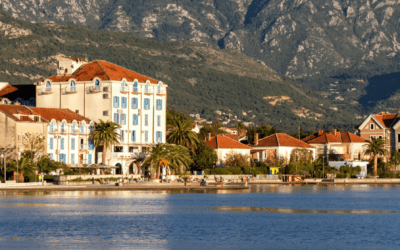What comes to your mind when you think of Costa Rica? Beautiful images of volcanoes, rainforests, and suspending bridges, or perhaps you know the country for entirely different reasons, like its friendly tax policies or private lifestyle options.
Maybe you want to spend your retirement days there, or perhaps you are one of the few people who don’t know much about Costa Rica other than its tropical status.
No matter which category you fall in, this article will offer valuable insights about Costa Rica and how you can move there.
Costa Rica has established itself as a lucrative offshore business jurisdiction due to its attractive tax incentives.
True to its English translation, i.e., Rich Coast, Costa Rica is rich in natural beauty, breathtaking views, and biodiversity. In fact, it contains nearly 6% of the world’s biodiversity. That’s surreal, considering that Costa Rica is not even 1% of the size of the US.
Speaking of retirees, Costa Rica regularly tops the charts for best retirement destinations, thanks to its large expat retiree community, affordable universal healthcare, and the Pura Vida lifestyle.
This article discusses moving to Costa Rica and how it can help you lower your taxes and adopt a more private lifestyle without the government peering into every single asset of yours.
Financial Benefits of Moving to Costa Rica

Tax Incentives and Exemptions
Costa Rica offers many tax incentives for individuals and corporations. For starters, Costa Rica has a territorial tax system meaning that all foreign income is tax-exempt.
Costa Rica makes it easy for investors and entrepreneurs looking to invest or incorporate a business in the country with as much privacy as possible.
For starters, anyone can start a company in Costa Rica irrespective of nationality and conduct business operations in or outside the country.
Moreover, companies incorporated in Costa Rica but operating overseas aren’t liable for local taxes.
Costa Rica’s corporate income tax rates are levied at a progressive rate, starting from 5% and reaching up to 30% for companies with an annual gross income over CRC 112,070,000 (currently, nearly USD 181225).
The country also has free trade zones with a range of tax exemptions for companies within its limits.
Moreover, Costa Rica also offers some excellent tax incentives for certain companies investing outside the greater metropolitan area, including but not limited to, a ten-year real estate transfer tax exemption and total VAT exemption regarding local purchases of goods or services (for business operations).
Also, there is no wealth or inheritance tax in Costa Rica.
Your Privacy is a Priority
When talking about tax havens, many people forget it’s not all about how many tax exemptions a country offers.
What makes a jurisdiction a true tax haven is how it treats an individual’s or a corporation’s privacy, whether in a professional or private capacity.
Tax haven or not, Costa Rica puts its best foot forward in keeping other people’s noses out of your business.
Not a fan of disclosing your identity while setting up an offshore company? Costa Rica has got you covered.
According to Costa Rican law, companies are not obligated to disclose the names of directors or beneficiary owners to the Registrar of Companies.
As an owner of the company, your name will not be filed in the public registry providing you and your shareholders with an extra layer of privacy in a world that seems to be forcing everyone to broadcast their private information.
That’s not all. Companies incorporated in Costa Rica don’t have to file annual reports with Costa Rican tax authorities. Talk about ultimate financial privacy and protection.
However, you still have to comply with all the relevant IRS and FATCA reporting, checks, and regulations if you are a US citizen.
No Exchange Controls
Costa Rica has a pretty developed offshore banking sector that boasts no exchange controls, meaning that capital or other financial assets can be transferred in or out of the country without any limitation on the amount
Moreover, you also don’t have to disclose the source of funds.
The country has many private and state-owned banks. The three state-owned banks are:
- Banco de Costa Rica (BCR)
- Banco Nacional de Costa Rica (BN)
- Banco Popular (BP)
Most foreigners and non-residents prefer state-run banks due to their reasonable fees (because they don’t generate a profit).
Moreover, BCR and Banco Nacional allow non-residents and tourists to open a bank account without legal residency. In contrast, most private banks won’t entertain a non-resident without legal residency status.
Also, the money kept in Costa Rican state-run banks is wholly insured, providing an extra layer of protection.
Other Benefits of Moving to Costa Rica

Impressive Expat Community
Costa Rica has a population of a little over five million, out of which over half a million are expats – most of whom, over sixty thousand, are from the US.
People visit Costa Rica for many reasons – to explore, retire, get medical treatments, benefit from tax incentives, and much more.
No matter why you visit Costa Rica, the country has a way of impressing you in a manner that keeps you coming back for more or even staying there forever – as evident from the large number of expats in Costa Rica.
Costa Rica has also made it into CNBC’s top ten list of countries where expats are the happiest with work, life, and cost of living.
Top Retirement Destination
Many expats living in Costa Rica are retirees, especially American retirees.
Costa Rica was also one of our favorite picks for the world’s best countries to retire.
Most expat retirees live in Costa Rica’s Central Valley, along with over seventy percent of the nation.
Central Valley comprises the capital city, San Jose, and the surrounding towns of Heredia, Alajuela, and Cartago.
It’s not hard to see why expats, especially retirees love Costa Rica’s Central Valley. The region offers excellent weather, quick access to quality healthcare, and worldly access via San Juantamaria International Airport (SJO) in Alajuela.
In addition to SJO, Costa Rica has one other international airport, Guanacaste (LIR), on the northern Pacific coast.
Another reason why retirees love Costa Rica so much is its diversity. Whether you want to live by the beach or in a high-end gated community, Costa Rica will have a place for you to call home.
Costa Rican Healthcare System
You’ll find two healthcare systems in Costa Rica. The state-run universal healthcare system, also known as Caja, and the private healthcare system.
Whether you go for public or private healthcare, you can expect quality medical advice and treatment at a price far lower than what you’d pay in the US or western European countries.
Most public and private hospitals are located in or around the capital city, San Jose.
Costa Rica boasts one of the best healthcare systems in Latin America. Costa Rican doctors are highly qualified, and most have received training from reputable institutes in the US or Europe, etc.
Moreover, there is no shortage of English-speaking doctors, especially in private medical facilities.
For people looking to move to Costa Rica as legal residents, it’s important to note that residency applicants must become members of Caja (the government healthcare system).
Cost of Living
One of the biggest reasons Costa Rica is so famous among expats and retirees is its cost of living.
From healthcare to transport to day-to-day expenses, Costa Rica is a pretty affordable place to live.
However, the cost of living in any place depends entirely on your lifestyle. If you live, shop, and eat like locals, with a dash of comfort and luxury, you’re bound to save tons compared to your life in the US, UK, Canada, or any other western country.
In Costa Rica, real estate prices in tourist spots, either to buy or rent, are typically higher than in standard residential areas.
Costa Rica is also full of healthy food options. With a farmer’s market, Feria, held every week in almost every town and village, you’ll find that consuming more nutritious produce and fresh meat in Costa Rica is far easier and lighter on the pocket.
Did you know:
Costa Rica’s Nicoya Peninsula region is one of the world’s seven Blue Zones. National Geographic credits the long life expectancy of Costa Ricans in the Nicoya region to the abundance of preservative-free fresh food and excellent climate.
Safe Jurisdiction
Costa Rica is one of the safest places to live in Central America. Moreover, reputable institutions like the World Economic Forum and International Living have termed Costa Rica one of the safest places to live as an expat.
The Global Peace Index ranks Costa Rica 38th out of 163 jurisdictions. Moreover, the literacy rate in Costa Rica is 96%, owing to the abundance of private and international schools.
Overall, Costa Rica offers a pretty high quality of life.
Rainforests, Beaches, and More
You’ve probably heard this many times, but it’s still worth a mention – Costa Rica is beautiful.
Costa Rica is a true tropical haven, from long stretches of unspoiled beaches on the Caribbean and Pacific coasts to dense rainforests teeming with diverse wildlife.
Mountain villages, breathtaking waterfalls, pristine lakes, and towering volcanoes – the country has it all and then some.
Whether you’re an outdoor person or not, you won’t be able to keep yourself from appreciating the natural splendor of Costa Rica.
Establishing Temporary Residency in Costa Rica

Whether you need a visa to enter Costa Rica depends upon your passport. Citizens of many countries, including the US, UK, EU, etc., can enter and stay visa-free in Costa Rica for ninety days.
For stays longer than ninety days, you must get a residence permit.
Costa Rica issues several visas and residence permits depending upon the nature of your stay, income, and profession. The country has a plan for you whether you’re an investor, retiree, or digital nomad.
The following are the most popular Costa Rican residence programs.
Pensionado Visa
One of the many reasons why retirees love Costa Rica is its Pensionado program which grants temporary residency to any foreign national with a lifetime pension/monthly income over USD 1000.
The lifetime pension could be in the form of social security, annuities, retirement funds, military pensions, or other guaranteed retirement benefits.
Keep the following things in mind when applying for the Pensionado visa:
- You must show proof of monthly income over USD 1000 (for life).
- Although the program is popular among senior citizens and retirees, it doesn’t impose an age limit for applicants.
- The visa is issued for two years and can be renewed after two years if you continue to meet all the visa requirements.
- For visa renewal, you must prove that you’ve lived in the country for four months per year (continuous or otherwise) and that you’ve been receiving your monthly income in Cost Rica.
Rentista Visa
A Costa Rican Rentista visa grants temporary residency to any foreign national with a stable and regular monthly income of at least USD 2500 for a minimum of two years.
Proof of monthly income must be made through an official letter issued by a financial institution, foreign bank, CPA certificate, or other titular entity certifying that the applicant will receive said monthly income for the next two years.
Keep the following things in mind when applying for the Rentista visa:
- You must show proof of monthly income of at least USD 2500 (for the next two years).
- Alternatively, you may show that you have an investment in a Costa Rican bank for the amount of USD 60,000 and that said amount would be disbursed to you every month.
- The visa is issued for two years and can be renewed after two years if you continue to meet all the visa requirements.
- For visa renewal, you must prove that you’ve lived in the country for four months per year (continuous or otherwise) and that you’ve been receiving your monthly income in Cost Rica.
Inversionista Visa
If you don’t qualify for the programs mentioned above or want to establish a temporary residency in Costa Rica by investing in the country, you should apply for the Inversionista visa.
Inversionista visa grants temporary residency to any foreign national with a minimum investment of USD 150,000 in Costa Rica.
The required investment may be in active business, real estate, stocks, or securities. For investment in forest plantations, the amount required is USD 100,000.
Keep the following things in mind when applying for the Inversionista visa:
- You must submit detailed descriptions of the investment route you chose, for example, real estate investment, stock investment, projects of national interest, etc.
- The visa is issued for two years and can be renewed after two years if you maintain your investment.
- For visa renewal, you must prove that you’ve lived in Costa Rica for six months per year (continuous or otherwise).
For all the visas mentioned above, you may include a spouse and children under 25 years (or older if they have a disability) as dependents.
None of the visas mentioned above offer the right to work as a Costa Rican employee. However, you can work on your own, start a business, or receive income from your investment (in the case of an Inversionista visa).
Establishing Permanent Residency in Costa Rica

No matter which temporary residence permit you go for, after three or more years of legal residency in Costa Rica, you may be eligible for permanent residency.
Costa Rican permanent residence permit must be renewed every five years. Moreover, to maintain permanent residency, you must visit Costa Rica once every year for 72 hours.
Permanent residents in Costa Rica enjoy the right to work as an employee for a Costa Rican employer.
Costa Rica Digital Nomad Visa

Thanks to its excellent climate, breathtaking views and friendly tax regime, digital nomads have always been attracted to Costa Rica.
In the past, digital nomads and perpetual travelers with no intention to establish residency in Costa Rica used to do border runs to extend their stay in the country without applying for a visa.
With the newly launched Costa Rica Digital Nomad Visa, you don’t have to leave Costa Rica anymore after every ninety days to extend your stay.
In 2021, assessing the rise of remote work and the popularity of remote work visas, Costa Rica announced its digital nomad visa.
The visa allowed remote workers, freelancers, and location-independent professionals to enter and stay in the country for a year as long as they work remotely and can prove the required monthly income, i.e., $3000 (USD), or $4000 for a family.
The digital nomad visa was announced in 2021. However, the government started processing the applications in July 2022.
In our experience, the employment requirements are usually irrelevant, and the main requirement to get the visa is to prove the monthly income mentioned above.
It’s important to note that the digital nomad visa is not a residence permit, nor does it lead to temporary or permanent residency in the country.
Things to Consider Before Moving to Costa Rica
Slower Pace of Life
They say one man’s trash is another man’s treasure. Something perfect for one person may be a deal breaker for another,
Thousands of people move to Costa Rica every year for its slower pace of life that keeps you close to nature and away from the hustle.
However, if that’s not you, you should think twice before planning a life in Costa Rica.
If you are a city person used to the fast-paced life where everything is on time, you may need to adjust your expectations in Costa Rica.
Tropical Climate
Usually, you’ll find people raving about the tropical climate and its perfection. However, the constant humidity or the long rainy season may be a deal breaker for people used to cooler temperatures.
Although Costa Rica is pretty diverse, with over thirty microclimates, you may need a bit of adjustment to adapt to the atmosphere.
Conclusion
Costa Rica has a generous immigration policy for westerners like the US, UK, or EU citizens (among other nationalities) who don’t need a visa to enter Costa Rica.
The country also offers various residence permits depending on your income, profession, and nature of stay.
Moreover, whether you want to live in Costa Rica permanently or temporarily, the country offers some excellent tax advantages and privacy incentives, especially for entrepreneurs.
Costa Rica scores well in most departments. Nonetheless, before you plan a move to Costa Rica, it’s highly advisable to reach out to professionals who can help you navigate your life in a foreign country – especially if you’re doing it to lower your taxes.
Costa Rica may score pretty high in the natural beauty department, but it’s still pretty average regarding bureaucracy and infrastructure.
To plan your life there, you’ll need proper offshore and tax planning by a team who has done it a thousand times before – that’s where we come in.
Reach out, and we’ll help you plan your best life in Costa Rica – full of freedom and financial stability, along with the best tax plan.
Lower Your Taxes by Moving to Costa Rica: The Ultimate Guide – FAQs
Major platforms like the World Economic Forum and International Living have termed Costa Rica one of the safest countries to retire as an expat.
Moreover, the vast population of expats, digital nomads, and tourists in Costa Rica speaks for the safety standards in the country itself.
There is no direct Costa Rican citizenship by investment program. However, you can get Costa Rican citizenship by naturalization after legally residing in Costa Rica for seven years, either as a temporary or permanent resident.
To become a Costa Rican citizen, you must have basic knowledge of spoken and written Spanish, pass a test about Costa Rican history and values, and have two witnesses who can testify to your conduct and livelihood.
If by tax haven you mean a tax-free country, then Costa Rica is far from a tax haven. However, with the right team, moving to Costa Rica can be the best way to lower your taxes legally.









